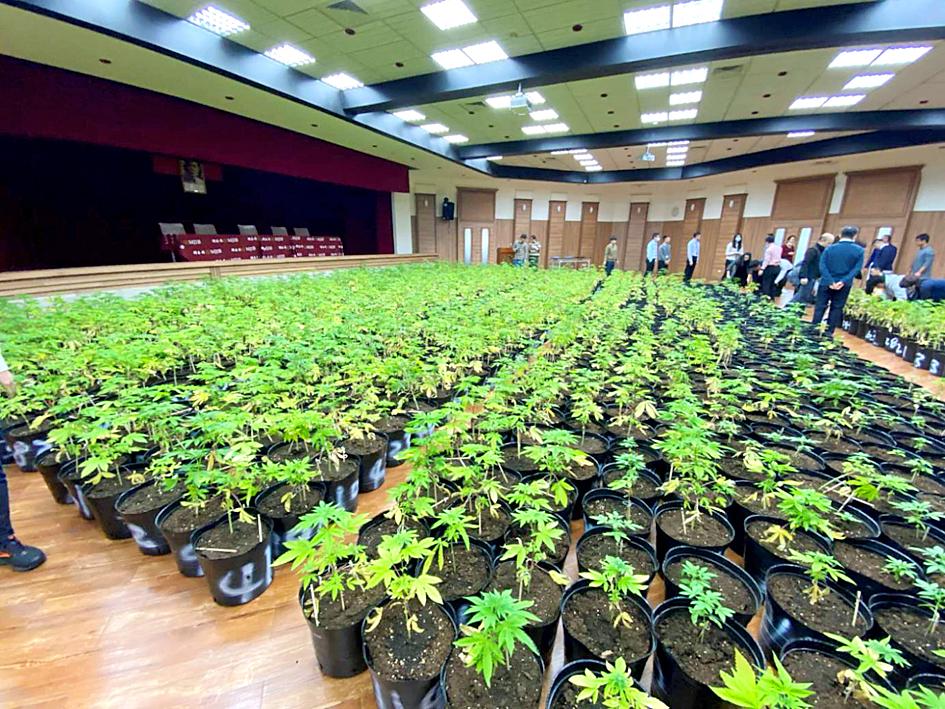Minister of Justice Tsai Ching-hsiang (蔡清祥) yesterday presented the results of a raid on an illegal cannabis farm in Hsinchu County, where police seized more than 1,600 cannabis plants with an estimated street value of NT$500 million (US$17.76 million).
It was the largest cannabis seizure in Taiwan, officials said.
Speaking at a news conference at the Ministry of Justice Investigation Bureau Taipei Field Station, Tsai reiterated his ministry’s tough stance against illegal drugs and said it would continue to crack down on cannabis.

Photo courtesy of the Ministry of Justice
Police on March 19 raided a greenhouse in the hills of Guanhsi Township (關西), a bureau official said.
Two men, surnamed Chiu (邱) and Yu (虞), were detained on suspicion of running the greenhouse, and 1,608 potted cannabis plants were seized.
The bureau in a statement touted the operation as highly successful.
It praised bureau officials “for working from early morning to late night on that day” to search the site, gather evidence and transport the seized plants to Taipei for investigation in the biggest domestic cannabis seizure.
An investigation has been launched into the criminal ring and its alleged mastermind, who is suspected of providing financial backing and instructions to Chiu and Yu, the bureau said.
The bureau said it waited until yesterday to announce the bust, as it was one day after April 20, which is an annual day of celebration for marijuana users.
Tsai and bureau officials at the news conference presented seized materials, including dried cannabis leaves and buds, machines and equipment for desiccating, cultivating and watering the plants, as well as lighting equipment.
They also displayed a video showing rows of seized potted cannabis.
“There are people in Taiwan advocating for the decriminalization of cannabis, but this does not conform to the conditions in our nation... Cannabis is still a Category 2 narcotic under the law and authorities will crack down against it,” Tsai said, referring to the Narcotics Hazard Prevention Act (毒品危害防制條例).
“It is our resolve to combat illegal drugs and we will not accept such a suggestion [decriminalization of cannabis]. Judicial investigators will continue to fight against cannabis smuggled from abroad or grown within our nation,” he added.
A group of more than 1,500 people on Saturday last week rallied outside the legislature to demand that the government decriminalize cannabis and legalize marijuana for medical use. The event drew a heavy police presence and sniffer dogs.
Officials at yesterday’s news conference told reporters that “each cannabis plant has a street value of NT$300,000 when dried and sold for consumption to users.”
The 1,608 plants seized at the raid would amount to nearly NT$500 million, which is “a record haul” for the bureau, they said.
However, marijuana advocacy group Green Sensation has in the past few years disputed the estimated values presented by officials, saying they are highly unrealistic and overly exaggerated.
It has accused the bureau and judicial investigators of announcing higher street prices to take more credit and gain higher performance citations, and for informants to claim higher monetary rewards for tip-offs.

Seventy percent of middle and elementary schools now conduct English classes entirely in English, the Ministry of Education said, as it encourages schools nationwide to adopt this practice Minister of Education (MOE) Cheng Ying-yao (鄭英耀) is scheduled to present a report on the government’s bilingual education policy to the Legislative Yuan’s Education and Culture Committee today. The report would outline strategies aimed at expanding access to education, reducing regional disparities and improving talent cultivation. Implementation of bilingual education policies has varied across local governments, occasionally drawing public criticism. For example, some schools have required teachers of non-English subjects to pass English proficiency

‘FORM OF PROTEST’: The German Institute Taipei said it was ‘shocked’ to see Nazi symbolism used in connection with political aims as it condemned the incident Sung Chien-liang (宋建樑), who led efforts to recall Democratic Progressive Party (DPP) Legislator Lee Kun-cheng (李坤城), was released on bail of NT$80,000 yesterday amid an outcry over a Nazi armband he wore to questioning the night before. Sung arrived at the New Taipei City District Prosecutors’ Office for questioning in a recall petition forgery case on Tuesday night wearing a red armband bearing a swastika, carrying a copy of Adolf Hitler’s Mein Kampf and giving a Nazi salute. Sung left the building at 1:15am without the armband and apparently covering the book with a coat. This is a serious international scandal and Chinese

TRADE: The premier pledged safeguards on ‘Made in Taiwan’ labeling, anti-dumping measures and stricter export controls to strengthen its position in trade talks Products labeled “made in Taiwan” must be genuinely made in Taiwan, Premier Cho Jung-tai (卓榮泰) said yesterday, vowing to enforce strict safeguards against “origin laundering” and initiate anti-dumping investigations to prevent China dumping its products in Taiwan. Cho made the remarks in a discussion session with representatives from industries in Kaohsiung. In response to the US government’s recent announcement of “reciprocal” tariffs on its trading partners, President William Lai (賴清德) and Cho last week began a series of consultations with industry leaders nationwide to gather feedback and address concerns. Taiwanese and US officials held a videoconference on Friday evening to discuss the

PERSONAL DATA: The implicated KMT members allegedly compiled their petitions by copying names from party lists without the consent of the people concerned Judicial authorities searched six locations yesterday and questioned six people, including one elderly Chinese Nationalist Party (KMT) member and five KMT Youth League associates, about alleged signature forgery and fraud relating to their recall efforts against two Democratic Progressive Party (DPP) legislators. After launching a probe into alleged signature forgery and related fraud in the KMT’s recall effort, prosecutors received a number of complaints, including about one petition that had 1,748 signatures of voters whose family members said they had already passed away, and also voters who said they did not approve the use of their name, Taipei Deputy Chief Prosecutor